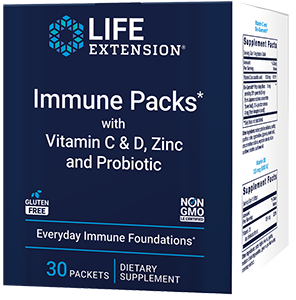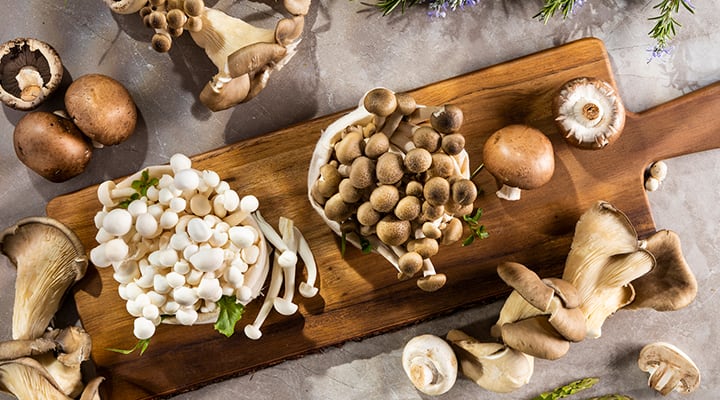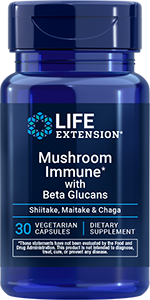
12 Immune System Supplements That Work
Published: September 2021 | Updated: October 2025
At a Glance
- The immune system is complex and requires the right support to keep it at its best.
- There are 12 supplements you may want to add to your supplement stack.
- They include vitamin C, vitamin D, zinc, probiotics and many more!
- Some immune health supplements can be taken year-round and others are ideal for seasonal challenges.
- Don't underestimate the importance of healthy habits in keeping your immune system strong.
If you think you're a hard worker, take a look at your immune system. It puts in the hours to make sure you can keep up with that extra-long to-do list. Don't you think you ought to give it as much love and support as possible? That's where immune system supplements come in.
Supplements can't replace your mom's homemade chicken noodle soup or substitute for a solid eight hours of restful sleep. But there are several nutrients that can help keep your immune system functioning at its peak. Let's go through the 12 best supplements for immune system health.
1. Vitamin C
Vitamin C is one of the most talked about vitamins for immune support. It's also one of the most accessible, because you can find it in foods like citrus fruits and cruciferous vegetables, like cauliflower and broccoli.
You'll want to load up on vitamin C for immune support, because it can:
- Enhance the integrity of your skin and the outer layer of the gut, which are the first lines of defense against challenges
- Serve as an antioxidant to protect against oxidative stress, particularly from environmental stressors
2. Vitamin D
Recent studies have revealed that 22% of Americans are moderately lacking in vitamin D intake. This can negatively impact your health—especially in terms of the immune system, cardiovascular system and bone health. Vitamin D is one of the essential immune system vitamins, because it helps:
- Fight immune system challenges
- Modulate the function of white blood cells
3. Zinc
Zinc is an essential mineral commonly found in avocado, spinach and beef. It's also frequently added to supplements. This mineral can benefit the immune system by:
- Supporting the development and activation of T-cells, a type of white blood cell that carry out immune system defenses
- Playing important roles in more than 300 enzymes, many of which are related to immune health
What Does the Immune System Actually Do?
Now that you know a little more about nutrients that keep your immune system at its best, let's backtrack a little.
How the immune system functions is actually quite complex. There are a number of processes and chemical reactions that take place to keep it running, all of which involve a wide network of cells, tissues and organs to fend off foreign invaders and environmental substances.
In simple terms, however, the immune system is an army with two lines of defense: innate and adaptive.
| Type | Key Characteristics |
|---|---|
| Innate |
|
| Adaptive |
|
4. Probiotics
Because they are best known for maintaining a healthy gut, it may surprise you that probiotics support immune health. Probiotics can also be found in the mouth and outside of the skin. These living microorganisms may play several roles in the immune system, including:
- Fortifying the epithelial and mucosal barriers, so they can effectively stop invaders from breaking through
- Maintaining white blood cell activation and response
5. N-acetyl-cysteine (NAC)
You may not be familiar with N-acetyl-cysteine, but here's a good reason to get to know it: there's evidence that NAC may support immune health.
- NAC replenishes intracellular glutathione (the body's master antioxidant)
- Inhibits oxidative stress
- It may also promote a healthy inflammatory response
6. Elderberry
Also known as Sambucus nigra, black elderberry is a fruit that has long been used for its immune-supporting properties. The berries should never be eaten raw, but when taken as a liquid or capsule supplement, elderberry can help:
- Influence different immune cells in both the innate and adaptive immune systems
- Modulate cytokine levels to promote a healthy inflammatory response
7. Garlic extract
Garlic doesn't just have a potent flavor and aroma—it's also a potent force against immune system challenges.
- According to a randomized controlled trial, garlic contains numerous compounds that influence NK cell function, making it easier to overcome seasonal challenges.
8. Quercetin
Quercetin is a flavonoid found in several foods, particularly red onions and apples.
- Flavonoids are highly regarded for their antioxidant protection and quercetin is no different.
- More research is needed, but quercetin may also play a significant role in modulating cytokines to keep your immune system running smoothly.
Explore Our Best Immune Support Supplements
9. Selenium
Selenium is considered the Goldilocks of minerals. You want to get just the right amount of selenium—not too much and not too little.
- This essential nutrient is mostly found in fish, eggs and grains. If you don't get enough of these foods in your diet, consider supplementation.
- Selenium may help support healthy function of the T-cells of the adaptive immune system.
10. Mushrooms
Various mushroom extracts can have beneficial effects on the immune system. Part of their power comes from beta-glucans, which are complex carbohydrates bound within the walls of certain organisms like mushrooms and yeast. Some mushrooms to look for include:
- Shiitake and maitake to support NK cell and T-cell activation
- Chaga to help stabilize mast cells, which are white blood cells that release histamine to fend off seasonal immune challenges
- Reishi to promote T-helper cells, which alert other white blood cells to the presence of a threat
11. Echinacea
Usually found in teas, lozenges and other oral supplements, echinacea is an herbal plant that has been studied to support immune system health by:
- Increasing NK cell activity
- Promoting a healthy inflammatory response
12. Lactoferrin
Lactoferrin is an iron-binding protein, mostly found in breastmilk, but it can also show up in tears, saliva and nasal mucus. Because lactoferrin usually binds to iron, it:
- Inhibits the binding of "bad bacteria"
- Promotes probiotic growth
Which immune supplements work better together?
Your immune system is not a single-person army, so you can't expect to have a single-nutrient supplement strategy. Does that mean you need all 12 of these immune health nutrients? No. But certain immune supplements work better together, so you can effectively fuel the whole immune system brigade.
| Supplement Pairing | Benefit |
|---|---|
| Vitamin C + zinc |
|
| Black elderberry + vitamin C |
|
| Vitamin D + beta-glucans |
|
How can you support your immune system without supplements?
Being that the immune system is so complex, there are multiple ways to support it. Supplements are a great addition, but they're only part of the puzzle.
The three biggest pieces you should work on are sleep, physical activity and nutrition. Focusing on these lifestyle components goes a long way in keeping you healthy year-round.
1. Sleep
There are a number of health benefits of sleep, including a better mood, improved memory and a regular appetite. In the same way sleep improves the brain's learning and memory, it can also strengthen the immune system's memory.
In other words, sleep helps your adaptive immune system recognize and respond to potential challenges. And that's not all. Sleep also plays an important role in the innate immune system, a.k.a. the first line of defense.
2. Movement
Extensive research has shown that a regular moderate-intensity exercise routine supports the immune system by enhancing both the innate and adaptive immune responses.
Even short bouts of exercise can bolster your defenses, because it stimulates the movement of innate immune system cells between the circulating blood and lymphoid tissues, increasing the immune system's ability to identify and defend against challenges.
But a word of warning: Avoid overtraining. It can negatively impact your immune health, so make sure you get adequate rest between workouts. Also avoid high-intensity exercise too late at night, simply because it can interrupt sleep.
3. Nutrition
Healthy nutrition is important for a variety of reasons when it comes to healthy immune function.
To ensure you get adequate amounts of these key nutrients, focus on eating lean proteins, whole grains and plenty of fruits and vegetables—the more colorful, the better. And consider supplements to help provide beneficial compounds that may be lacking in your diet.
Are immune supplements okay to take every day?
Immune supplements are generally suggested to be taken daily. In fact, it's encouraged to maintain adequate daily intake of essential vitamins and minerals, including vitamins C and D. Other nutrients, like certain types of zinc, are meant to offer seasonal support. Always read the product label to ensure you're taking supplements as directed.
What happens when immune cells get old?
As our bodies get older, so do our immune cells. This is a well-known process called immune senescence. Unfortunately, age-related decline in cellular health can negatively impact immune system function. This is exactly why healthy lifestyle choices and immune support supplements are important.
If you're not sure exactly which immune system supplements to take, try our supplement quiz. It will help narrow down the choices for your unique health needs.
Key Takeaways
- From vitamin C to elderberry, to zinc and lactoferrin, there are a wealth of supplements designed to support your immune system.
- Many immune health supplements work hand in hand to further bolster your healthy defenses.
- Don't forget to focus on lifestyle choices like quality sleep, a nutritious diet and regular exercise to go hand-in-hand with your supplement strategy for an immune system army that can't be beat.
References
- Balogh L, et al. "The Effect of Aerobic Exercise and Low-Impact Pilates Workout on the Adaptive Immune System." J Clin Med. November 2022. https://pubmed.ncbi.nlm.nih.gov/36431291/
- Bergandi L, et al. "Vitamin D and Beta-Glucans Synergically Stimulate Human Macrophage Activity." Int J Mol Sci. May 2021. https://pubmed.ncbi.nlm.nih.gov/34064458/
- Carr AC, Maggini S. "Vitamin C and Immune Function." Nutrients. November 2017. https://pmc.ncbi.nlm.nih.gov/articles/PMC5707683/
- Cui A, et al. "Prevalence, trend, and predictor analyses of vitamin D deficiency in the US population, 2001-2018." Front Nutr. October 2022. https://pmc.ncbi.nlm.nih.gov/articles/PMC9573946/
- Dixon BM, et al. "Positive correlation between circulating cathelicidin antimicrobial peptide (hCAP18/LL-37) and 25-hydroxyvitamin D levels in healthy adults." BMC Res Notes. October 2012. https://pubmed.ncbi.nlm.nih.gov/23095332/
- Irwin MR, Opp MR. "Sleep Health: Reciprocal Regulation of Sleep and Innate Immunity." Neuropsychopharmacology. January 2017. https://pmc.ncbi.nlm.nih.gov/articles/PMC5143488/
- Jafari A, et al. "Zinc supplementation and immune factors in adults: a systematic review and meta-analysis of randomized clinical trials." Crit Rev Food Sci Nutr. 2022. https://pubmed.ncbi.nlm.nih.gov/33356467/
- Kiselova-Kaneva Y, et al. "Sambucus ebulus (Elderberry) Fruits Modulate Inflammation and Complement System Activity in Humans." Int J Mol Sci. May 2023. https://pubmed.ncbi.nlm.nih.gov/37240060/
- Ma C, Hoffmann PR. "Selenoproteins as regulators of T cell proliferation, differentiation, and metabolism." Semin Cell Dev Biol. July 2021. https://pubmed.ncbi.nlm.nih.gov/33214077/
- Melchart D, et al. "Immunomodulation with echinacea - a systematic review of controlled clinical trials." Phytomedicine. December 1994. https://pubmed.ncbi.nlm.nih.gov/23195946/
- Nantz MP, et al. "Supplementation with aged garlic extract improves both NK and γδ-T cell function and reduces the severity of cold and flu symptoms: a randomized, double-blind, placebo-controlled nutrition intervention." Clin Nutr. June 2012. https://pubmed.ncbi.nlm.nih.gov/22280901/
- Nieman DC, Wentz LM. "The compelling link between physical activity and the body's defense system." J Sport Health Sci. May 2019. https://pmc.ncbi.nlm.nih.gov/articles/PMC6523821/
- Papp G, et al. "Regular Exercise May Restore Certain Age-Related Alterations of Adaptive Immunity and Rebalance Immune Regulation." Front Immunol. April 2021. https://pubmed.ncbi.nlm.nih.gov/33936054/
- Stich L, et al. "Polysaccharides from European Black Elderberry Extract Enhance Dendritic Cell Mediated T Cell Immune Responses." Int J Mol Sci. April 2022. https://pubmed.ncbi.nlm.nih.gov/35409309/
- Suni E. "How Sleep Affects Immunity." Sleep Foundation. July 2025. https://www.sleepfoundation.org/physical-health/how-sleep-affects-immunity
- Wintergerst ES, et al. "Immune-enhancing role of vitamin C and zinc and effect on clinical conditions." Ann Nutr Metab. 2006. https://pubmed.ncbi.nlm.nih.gov/16373990/
- "In brief: The innate and adaptive immune systems." National Library of Medicine. https://www.ncbi.nlm.nih.gov/books/NBK279396/
Always be in the know!
Access the latest deals, wellness news, expert health tips & more!













